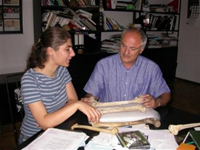
|
|
This undated handout photograph shows scientists David Lordkipanidze and Tea Jashashvili with remains of early human ancestors excavated at a site in the nation of Georgia. [Reuters]
|
The earliest-known human ancestors to migrate out of Africa possessed a surprising mix of human-like and primitive features, according to scientists who studied remains dug up at a fossil-rich site in the former Soviet republic of Georgia.
Writing on Wednesday in the journal Nature, the scientists described remains of three adults and one adolescent dating from about 1.77 million years ago, excavated at Dmanisi, about 55 miles southwest of the Georgian capital, Tbilisi.
The remains shed light on a little-understood but critical period in human evolution -- the transition from the more ape-like creatures known as australopithecines to the genus Homo, of which modern humans are a member.
The spines and lower limbs found at the Dmanisi site appear very much like modern humans, suggesting these individuals, which walked fully upright, were highly capable of long-distancetreks, the researchers said.
But other aspects of the skeletons had more archaic characteristics. The arms were more like australopithecines than people, and the primitive skulls encased relatively small brains. Their simple stone tools also are less advanced than one might have expected, the researchers said.
They described the remains as "a surprising mosaic" of primitive and modern features.
"These are the earliest humans found outside of Africa. This is the time when our genus spread outside of Africa," David Lordkipanidze of the Georgian National Museum, who led the research, said in a telephone interview. "Their heads are primitive. Their legs are very human-like."
Scientists had previously described skulls found at the site, but in recent years found far more extensive remains of the skeletons of these creatures, giving them a more detailed understanding of these denizens of early human history.
點擊查看更多雙語新聞
(Agencies)
|
科學家近日在前蘇維埃社會主義共和國格魯吉亞境內一處已被挖掘的化石遺跡考察時驚訝地發現,早期離開非洲大陸遷徙到其他地方的人類祖先兼具遠古人類和猿類雙重特點。
周三出版的《自然》雜志撰文說,科學家在格魯吉亞首都第比利斯西南部約55英里一處名為德馬尼西的地方發現了四具距今約177萬年的化石, 其中包括三個成年人和一個青年人。
它們的出現將人們的目光聚焦到人類進化史中一段鮮為人知但十分重要的階段,即從古猿又稱更新紀靈長動物,進化到人類的過程,其中包括現代人類。
研究人員指出,該遺跡發現的早期人類脊骨和下肢化石與現代人類極其相似,說明這組化石完全具有人類直立行走特征,可以應付長距離跋涉。
但是它們的骨骼化石同時具有古猿特點,比如上肢更像更新紀靈長動物,且大腦較小。另外,他們使用的簡單石器也比想象中要落后。
研究人員稱該化石是兼具古猿類和現代人類雙重特點“令人驚訝的綜合體”。
“這是在非洲大陸以外發現的最早的人類化石,遠古人類也在那時開始逐漸離開非洲,遷徙到世界各地”,此次研究的領導者,格魯吉亞喬治亞國立博物館的大衛洛基帕尼澤在電話采訪中說到,“它們的頭類似古猿,但是下肢卻和人類相似。”
科學家以前曾對該地區發現的頭骨化石進行過研究。近年來,越來越多的骨骼化石被發現,為他們進一步了解這些人類歷史早期居民提供了更多詳細的依據。
(英語點津于楠編輯)
|